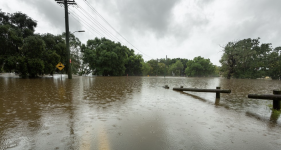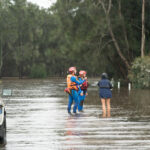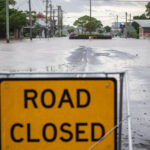Government’s Disaster Payments Labelled ‘An Insult’

With large parcels of Sydney, the Hunter Valley and surrounding areas under water during the past few weeks, devastated by flood for the second time in several months, the Albanese Government has responded by offering a $1,000 emergency payment for every adult affected, and $400 for every child.
It was a similar response that the Morrison Government and the NSW State Government provided to flood victims in Northern New South Wales earlier in the year.
Payment ‘an insult’
But the government’s response has been labelled ‘an insult’ to those whose lives have been turned upside down as a result of the disasters, with many calling on governments to redirect funds from projects considered less serious and towards those in real need.
For those directly affected, our elected official are overlooking the dire impact of what is going on and what needs to be done to prevent it from happening over and over again.
People have had their lives decimated by natural disaster, and governments have not only failed – in the opinion of many – in their immediate duty of care, but continue to fail in their overarching responsibility – a duty to protect Australians from natural disaster as best as possible.
Whether or not you believe in the climate science or not, anyone with even the tiniest degree of perceptivity can discern that the climate IS, changing. It is very different from what it was a generation ago. In the past several years Australia has been decimated by drought, bushfires, and now floods.
Government allows developments in flood-prone areas
But climate change is not the only factor. Governments are under fire, and have been for some time, for allowing residential and commercial development in well-known flood-prone areas, leaving residents at risk of not being insured. The insurers have defended their policies.
So who is left to pick up the tab? Emergency Government funding kicks in, but as those affected by the 2019 bushfires will attest, the money is typically not enough, and slow to come. Some bushfire victims have only just managed to rebuild their homes, almost three years on.
The same scenario has been experienced by those in Northern New South Wales, parts of which have flooded four times in less than 6 months. Most of the communities affected by flood are now resigned to feeling ‘abandoned’ by Governments at both a State and Federal level and are simply relying on each other for what they need.
For decades there has been ‘talk’ of buying back homes in flood prone areas in Lismore. Now, a recent report recommends that people in those areas be offered a ‘land swap’ agreement but the local council has suggested that the project is too big for the limited resources and expertise available within local government body, and it needs the support and assistance of the State Government, which is unlikely to get involved until an independent inquiry report is completed at the end of July / early August.
When is the solution coming?
Emergency funding can’t continue to fund these natural disasters forever – it’s just not sustainable economics.
Yet, there is very little talk at a Federal or a State level about realistic alternative solutions. In fact when Sydney floods peaked recently and Premier Dominic Perrottet was questioned about whether the whole landscape needed a re-think, his response was that it was ‘too premature’ to consider a solution, and that the priority, in that moment, was emergency response and getting people out of harm’s way to safety.
He made a salient point. But when exactly is a good time to consider some long-term plans? Certainly, the natural disasters show no signs of abating – there may never be an ‘ideal’ time to make plans for the future, so why not now?
The lack of political response means that people remain homeless, or bunked in over-crowded spaces with relatives or friends and neighbours, or living in unsanitary, unhealthy conditions in homes that have not been repaired.
Something we know for certain – which was demonstrated most recently during Covid-19 – is that when people are homeless, every other aspect of their lives also risks falling apart – mental and emotional wellbeing, financial security, and job stability, physical health, relationships … and the list goes on.
When homeless people were taken off the streets and into accommodation at the peak of the pandemic, after settling in, a majority of them reported that they began to feel a sense of hope for the future and their own place within it.
The value – for the whole of society – in making sure that people have a safe place to sleep is almost immeasurable. Having a secure base allows people to work, study, look after their health and be productive members of their communities.
What we have now is thousands of people stressed and traumatised. Not just a handful – thousands. These people need more than just a safe place to live, they also need access to vital support services to help them to rebuild their resilience, which must be done before they can be expected to be able to contribute fully and confidently to society again.
Short-sighted, selfish decision-making
What’s more, they need decisions and a plan so they don’t continue to live in uncertainty and fear of the next flood or bushfire, in the face of Government indecision and inaction.
While Governments penny pinch, and offer tiny, unrealistic emergency payments, and continue to count the financial cost, they remain short-sighted.
Continually spending emergency funds is a waste of money. Spending on research and practical solutions that keep people as safe as possible from natural disasters is an investment. There’s a big difference.
Several studies in the past decade or so have pointed out that one of the most serious side effects of climate change is that it creates climate refugees. Successive Australian Governments have not taken these warnings seriously or dedicated the appropriate resources to disaster mitigation or future planning beyond election cycles. We’re now seeing and experiencing the result of years of continued negligence.
What more will it take before politicians wake up to the fact that it is their job to make decisions which progress Australia and Australians, rather than continue to fail us in the hope that someone else will solve the problem?







